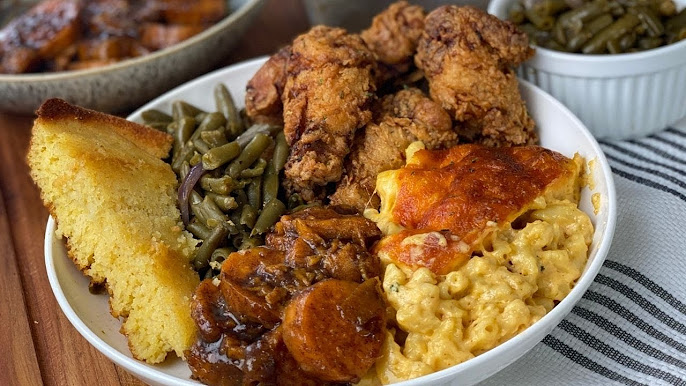The Rich History and Legacy of African American Soul Food
- Maya Smith
- Jun 11, 2025
- 3 min read
Updated: Jun 17, 2025

By Maya Simone Smith
African American soul food is a culinary tradition deeply rooted in the history and culture of the African American community. It's a testament to the resilience, creativity, & adaptability of a people who transformed humble ingredients into a cuisine that is celebrated worldwide.
Origins of Soul Food
The roots of soul food can be traced back to the Transatlantic Slave Trade of the1800s. Enslaved Africans brought to America were often given meager rations and leftover ingredients by their enslavers. They used their knowledge of African cooking techniques and flavors to create nourishing meals from these limited resources. Staples such as rice, okra, black-eyed peas, collard greens, and yams were adapted into dishes that are now synonymous with soul food.
Culinary Influences
Soul food is a blend of African, Indigenous Native American, and European culinary traditions. For example, the use of cornmeal and turnips was influenced by Indigenous Native American agricultural practices. The cooking techniques, such as slow-cooking and frying, have roots in African traditions, as well as collard greens. European influence is seen in the use of ingredients such as pork and macaroni and cheese.
Evolution of Soul Food
As African Americans migrated from the rural South to urban areas across the United States during the Great Migration, soul food evolved. It became more than just sustenance; it was a connection to home and heritage. African American families opened restaurants that served soul food, providing a taste of the South in cities like Chicago, New York, Atlanta, and Los Angeles.
Popular Dishes
Some of the classic soul food dishes include:
Fried Chicken: Crispy on the outside and juicy on the inside, fried chicken is a staple in soul food cuisine.
Collard Greens: Typically, slow cooked with smoked meat, these greens are a beloved side dish.
Macaroni and Cheese: A creamy, cheesy delight that is often baked to perfection.
Cornbread: A slightly sweet bread that complements savory dishes.
Sweet Potato Pie: A spiced dessert that is a favorite during the holiday season.
The Legacy of Soul Food
Today, soul food continues to be an integral part of African American culture and a source of pride for the community. It serves as a culinary bridge connecting generations, with recipes and traditions passed down through families. Beyond its delicious flavors, soul food represents a rich tapestry of history and identity, embodying the struggles and triumphs of a resilient people.
In recent years, there has been a resurgence of interest in soul food, with chefs and home cooks alike revisiting traditional recipes and adding contemporary twists. This revival is not only preserving the legacy of soul food but also bringing it to new audiences. Chefs are exploring innovative ways to honor the roots of soul food while incorporating modern flavors and techniques, resulting in a vibrant, evolving cuisine that continues to captivate and inspire.
Moreover, soul food's influence has transcended cultural boundaries, with its flavors and dishes being embraced by people from all walks of life. This widespread appreciation highlights the universal appeal of soul food and its ability to bring people together around the table, fostering a sense of community and shared experiences. It's not just about the food itself, but the stories, memories, and connections that are woven into each meal. Soul food gatherings often serve as a backdrop for celebrations, family reunions, and community events, where laughter and love are as abundant as the dishes being served.
As we continue to celebrate and expand the legacy of soul food, it's important to recognize its origins and the cultural significance it holds. By doing so, we honor the past while also paving the way for future generations to enjoy and innovate within this rich culinary tradition. In essence, soul food is much more than a collection of recipes; it is a living testament to the power of food to preserve heritage, build community, and inspire unity. Whether enjoyed in its traditional form or with a modern twist, soul food remains a cherished part of the African American culinary landscape, inviting everyone to partake in its warmth and richness.




Comments